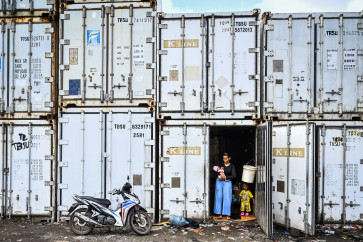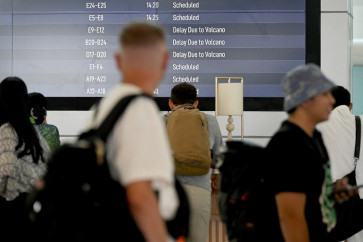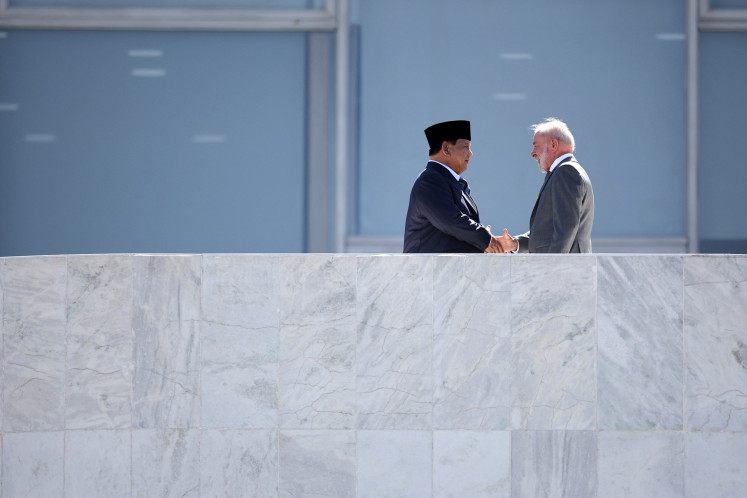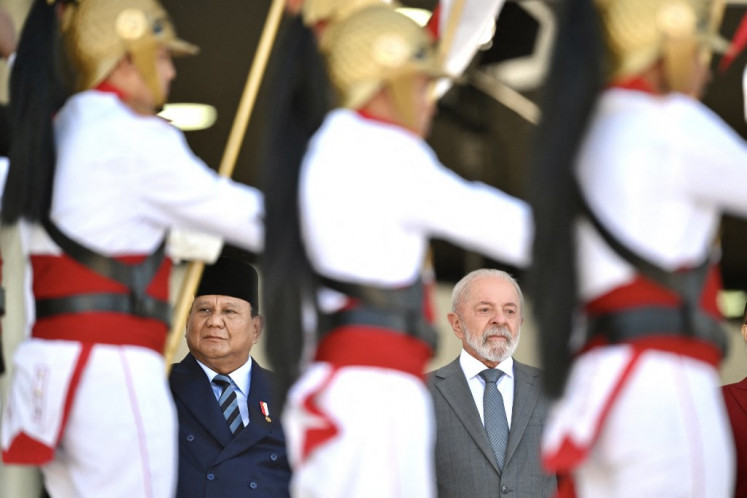Popular Reads
Top Results
Can't find what you're looking for?
View all search resultsPopular Reads
Top Results
Can't find what you're looking for?
View all search resultsE-commerce players must improve customer engagement, differentiate themselves: Survey
Indonesia’s e-commerce companies are having to work harder to maintain sales figures, although frequent shopping festivals have racked up purchases, says a recently published survey
Change text size
Gift Premium Articles
to Anyone
I
ndonesia’s e-commerce companies are having to work harder to maintain sales figures, although frequent shopping festivals have racked up purchases, says a recently published survey.
The "Why We Buy" survey by online advertising company Criteo, published Tuesday, indicates that shopping festivals are not the only draw for customers.
Pauline Lemaire, Criteo's account strategy director for Southeast Asia, Taiwan and Hong Kong, said that relying on shopping festivals was not profitable in the long run, although the resulting sharp increase in sales was good in terms of gross merchandise value (GMV).
However, e-commerce companies “are also faced with a real challenge to differentiate themselves”, Pauline told The Jakarta Post by email after the survey's Jakarta launch.
“Our [survey] has shown that lowering prices is not the only way to win consumers’ hearts. Other considerations include ensuring the best value for money and a wide product selection,” she said.
Amid the rapid growth in the digital economy, economists and market analysts around the world are calling for businesses to focus on profit and loss and not just GMV — the traditional North Star metric (NSM) for a start-up's core value.
GMV measures total volume in sales value of merchandise sold through e-commerce platforms, which primarily facilitate transactions rather than promote direct sales. On the other hand, e-commerce companies earn revenue as facilitators through service or advertising fees.
Economist and former finance minister Chatib Basri recently said that he "did not believe in GMV", especially amid the threat of a global recession that could adversely affect start-up funding.
“If [start-ups] rely only on raising funds, some day, when there is a sudden shock that [halts] funding, they will no longer be able to burn money and the impact will be systemic,” he said.
Pauline said e-commerce companies should improve customer engagement and formulate a mobile app strategy, because "people are not only sensitive to prices".
She stressed the importance of developing a mobile app strategy, particularly for e-commerce companies operating in Indonesia, since most transactions were made via mobile apps. For example, 54 percent of all transactions made during the 2018 National Online Shopping Day (Harbolnas) used mobile apps.
Online shoppers in Indonesia have been spoiled by a series of shopping festivals, from the 10.10 festival on Oct. 10 to Singles Day in November and to Harbolnas, an annual event that was launched in 2012 by the Indonesian E-Commerce Association (idEA) and typically falls in December.
"People are not only sensitive to prices."
Criteo senior account strategist McCarl Leonardo said that Harbolnas was an effective promotional event, as the e-commerce conversion rate (ratio of transactions to online visitors) was very high, reaching 94 percent in 2018.
The 2018 Harbolnas also increased nationwide online retail sales by 389 percent and the number of online visitors by 148 percent, he said, citing Criteo research figures.
He added that the large contribution Harbolnas made to elevating overall e-commerce sales showed that it remained the most popular shopping event in the country compared to the 11.11 and 10.10 events.
Harbolnas' popularity is also evident in comparing the e-commerce conversion rate between the shopping events: Last year's 11.11 festival increased nationwide online sales by 174 percent and online traffic by 37 percent, while the 10.10 festival grew online sales by 106 percent and online traffic by 30 percent.
Meanwhile, idEA chairman Ignatius Untung noted that “Harbolnas transactions show a continued upward trend.”
The 2018 Harbolnas booked Rp 6.8 trillion (US$482 million) in total transactions, up 31 percent from Rp 4.7 trillion in 2017, with local products making up nearly 50 percent of all transactions (Rp 3.1 trillion).
Untung added that this year's Harbolnas, slated to run on Dec. 11 and 12, expected upward of 300 participants offering items under a variety of product categories: electronics, fashion and beauty, food and beverages, groceries, travel, furniture, services, automotive and mother and baby.
E-commerce companies participating in the 2019 Harbolnas were targeting around Rp 7.8 trillion in total transactions, with leading e-commerce companies like Bukalapak, Zalora and Blibli planning to offer discounts of up to 90 percent. (dfr)










